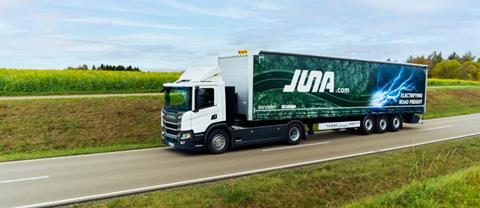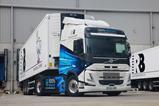Scania and sennder have joined forces to establish JUNA, a pioneering joint venture that aims to drive the widespread adoption of electric trucks in European road logistics. This innovative partnership introduces a pay-per-use model, eliminating upfront costs and providing guaranteed loads for transport companies.

Scania and sennder Technologies have announced the establishment of JUNA, a joint venture aimed at promoting the large-scale adoption of electric trucks and advancing the decarbonisation of European road logistics. This collaboration combines sennder’s advanced technology with Scania’s premium electric truck offerings to introduce a pioneering pay-per-use model, providing transport companies access to electric truck solutions and guaranteed capacity. JUNA’s innovative approach removes barriers to electric truck adoption, making it more accessible for carriers and helping reduce carbon emissions in the transportation sector.
JUNA’s pay-per-use model addresses the financial challenges associated with the higher upfront costs, residual value concerns, and technology risks of electric trucks. Additionally, it offers access to guaranteed loads through sennder’s digital platform, ensuring commercial predictability for customers. The joint venture leverages Scania’s premium electric trucks and tailored services along with sennder’s technology for connecting small and medium carriers with major shippers, aiming to accelerate the decarbonisation of European road freight logistics.
JUNA’s comprehensive offering includes premium electric vehicles, repair and maintenance services, insurance, digital and analytics services. Through data analysis, JUNA optimises electrification strategies and simulates routes for electric truck suitability. By removing the risks associated with electric truck adoption and streamlining operations, JUNA aims to play a pivotal role in reducing carbon emissions and advancing the transition to low-emission transport.
A pilot project has already been launched, with the first customer using an electric truck charged with renewable energy, performing up to ten lanes per week, similar to its diesel predecessor.


















